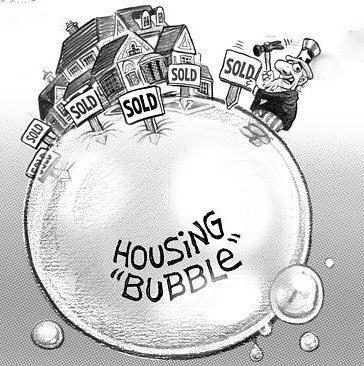Housing has been heating up in many cities for the last few years. It feels like 2004 again.
So, that being the case, is 2017 the next crash? My feeling is that this market will continue through at least Jan 2017 because incumbent party will always prop up the market in an election year (2016) by keeping interest rates low.
But, here’s 7 factors that could cause a crash in 2017 or 2018:
1. Rising interest rates (3+ more points)
Interest rates at 4% or so makes buying power and incentives to buy stronger, particularly since rents far outpace mortgage payments on low to middle-priced homes in most markets. But, with growing debt and worldwide economic uncertainties, the Federal Reserve may have to increase interest rates to attract more debt. A few points won’t be a big problem, but if rates creep up to 8% or more, it makes buying less attractive compared to renting. While, historically, 8% is still a fairly reasonable cost of funds, it will certainly drive people out of the buying mode, which affects the demand/supply curve. Of course, this rise in rates could also be coupled with easing of credit and the reintroduction of “Option ARM” loans, which could mask the rise the rates for some borrowers (not to mention create another problem that could blow up down the road).
2. Change in the tax laws
Politicians have been pushing for a massive reform of the tax code. While lower rates can stimulate the economy generally, a removal of real estate tax breaks could hurt the housing market. If there’s no mortgage interest deduction, for example, this could dissuade many people from buying, thus reducing overall demand for housing. It is unlikely that a flat-tax model with no deductions will ever get through the political machine that we have, but phasing out the deductions for higher income home buyers could still have some affect on demand.
3. Change of gov’t backing of mortgages
Fannie and Freddie are big players in the market, buying or guaranteeing some half the mortgages originated in America. A tightening of policy could make it harder for people to get loans, thus reducing the number of buyers. Ditto for FHA loans.
4. New wars
Wars cost money and create instability in the world financial markets. This could cause rising borrowing and thus interest rates. Terrorism in the U.S. could also be an “X” factor.
5. Immigration Policy
Assuming there are some 10-15 million people living in the U.S. without citizenship, could making them “legal” encourage house buying? Possibly. One thing is for sure; doing nothing means uncertainty, and uncertainty makes it difficult for these people to buy houses (note: this is not a political statement, just an assessment of the demand/supply factors).
6. New building catching up inventory
Building of new homes is back, with permits maxed out in many counties. Still, it won’t be enough to catch up in most markets until 2017 or 2018. Also, most new home building is targeted at middle to high-middle income earners. Low income housing will remain in limited supply.
7. Mass migration between states
Real estate is local, so pay more attention to what’s going on in your local markets than the national picture. Watch for new development, changing housing policy at the county and city levels, and employment factors that drive people in or out of your city.
